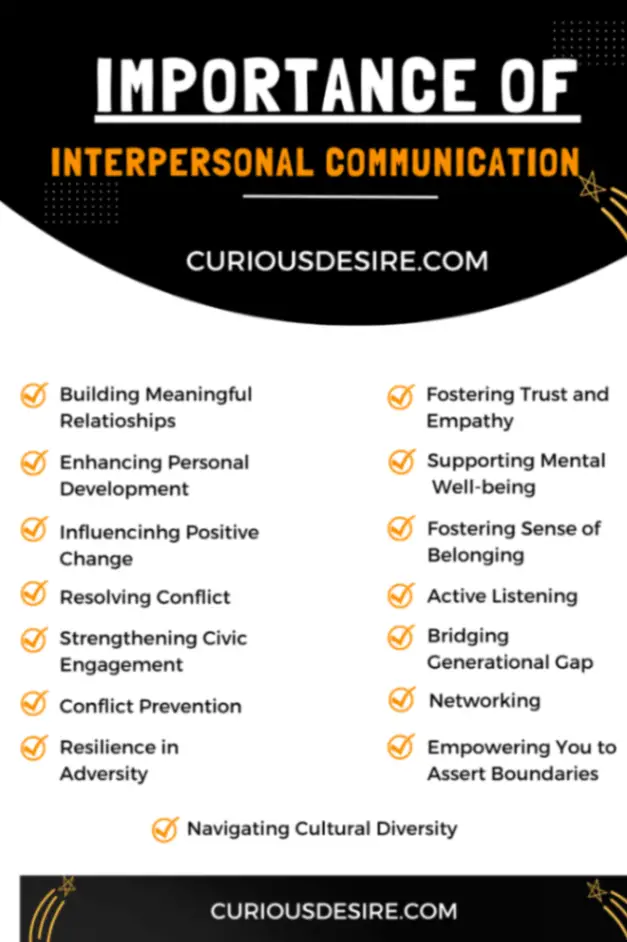In a world dominated by technology and digital interactions, the significance of interpersonal communication may sometimes be overlooked
Interpersonal communication is the cornerstone of human interaction.
It involves the exchange of information, feelings, and meaning through verbal and non-verbal messages.
It forms the basis of personal and professional relationships and plays a crucial role in shaping our social and emotional well-being.
In this blog, we will explore the significance of interpersonal communication and how it influences every aspect of our lives.
5 most effective reasons for the importance of interpersonal communication:
- Building Meaningful Relationships
- Resolving Conflicts
- Supporting Mental and Emotional Well-being
- Fostering a Sense of Belonging
- Nurturing Creativity and Innovation

1. Building Meaningful Relationships
Effective interpersonal communication is essential for building and maintaining meaningful relationships.
Whether it’s with family members, friends, or colleagues, the ability to express oneself clearly and listen attentively is crucial for nurturing healthy connections.
Through open and honest communication, you can deepen your understanding of each other, and strengthen your bonds.
Conflict is inevitable in any relationship, but effective interpersonal communication can help navigate disagreements and resolve conflicts constructively.
2. Resolving Conflicts
Effective conflict resolution begins with open dialogue.
Conflicts are a natural part of any relationship, but how they are managed can make a significant difference.
Interpersonal communication provides a platform for addressing differences and finding mutually acceptable resolutions.
By engaging in constructive dialogue and active listening, you can navigate conflicts with empathy and understanding, ultimately fostering stronger and more resilient relationships.
3. Fostering Trust and Empathy
Communication is the foundation of trust and empathy.
By being open and truthful in your interactions, you can establish credibility and reliability with others.
When you communicate openly and honestly, you create an environment of trust and understanding. This, in turn, leads to a greater sense of empathy and emotional connection, as people feel valued and heard.
In personal and professional settings, trust and empathy are vital for creating a supportive and collaborative environment.
4. Enhancing Personal and Professional Development
Effective interpersonal communication skills are essential for personal and professional growth.
Whether it’s conveying ideas in a team meeting, negotiating with clients, or expressing emotions to loved ones, the ability to articulate thoughts and feelings is crucial.
Additionally, active listening and empathy play a significant role in understanding others’ perspectives, leading to better collaboration and problem-solving.
Confidence in communication translates into confidence in various aspects of life, including personal relationships, career advancement, and self-expression
5. Supporting Mental and Emotional Well-being
Interpersonal communication has a profound impact on mental and emotional well-being.
The ability to express one’s emotions, seek support, and engage in meaningful conversations can alleviate feelings of isolation and stress.
Having a strong support network, facilitated by effective communication, can significantly contribute to overall mental health and resilience.
6. Navigating Cultural and Social Diversity
In an increasingly interconnected world, effective interpersonal communication becomes essential for navigating cultural and social diversity.
Respectful and inclusive communication fosters understanding and appreciation of different perspectives and experiences.
By embracing diversity and engaging in meaningful dialogue, you can bridge cultural gaps and build harmonious relationships within your communities and workplaces.
7. Strengthening Leadership and Team Dynamics
Leadership and interpersonal communication are inherently intertwined.
Effective leaders are skilled communicators who can inspire, motivate, and guide their teams.
Strong interpersonal communication within teams cultivates a positive and productive work environment, leading to enhanced collaboration and overall performance.

8. Influencing Positive Change
Interpersonal communication plays a pivotal role in influencing positive change on a broader scale.
Whether it’s advocating for social causes, initiating community dialogue, or mobilizing collective action, effective communication is instrumental in driving meaningful change.
Positive change often requires collective effort. Interpersonal communication fosters collaboration by promoting open dialogue, active listening, and mutual respect
9. Fostering a Sense of Belonging
Feeling connected and valued is fundamental to human experience.
Interpersonal communication plays a crucial role in fostering a sense of belonging within families, friendships, and communities.
By openly sharing experiences, thoughts, and emotions, you can create environments where everyone feels heard, understood, and included.
10. Resilience in Adversity
During challenging times, effective interpersonal communication provides a sense of support and resilience.
Whether facing personal hardships or navigating global crises, the ability to communicate openly and empathetically helps you and your communities navigate adversity with greater strength and cohesion.
Interpersonal communication facilitates the formation of social support networks, which are crucial for resilience.
By communicating openly and seeking support from friends, family, colleagues, or support groups, you can access emotional, practical, and informational support during times of adversity.
11. Conflict Prevention and Management
Effective interpersonal communication plays a vital role in preventing conflicts from arising and managing them when they do occur.
By fostering open and honest communication channels, you can address issues before they escalate into conflicts.
Strong communication skills enable you to navigate conflicts peacefully, understand differing perspectives, and find mutually acceptable solutions.
12. Promoting Active Listening
Active listening is a crucial component of interpersonal communication.
It involves fully concentrating on what the other person is saying, understanding their message, and responding appropriately.
By promoting active listening, interpersonal communication facilitates deeper understanding, builds trust, and strengthens relationships.
It allows you to validate others’ perspectives, reduce misunderstandings, and cultivate empathy and connection.
13. Building Self-Awareness and Emotional Intelligence
Interpersonal communication provides opportunities for you to reflect on your thoughts, feelings, and behaviors, thereby enhancing self-awareness.
By engaging in meaningful interactions with others, you can gain insights into your strengths, weaknesses, and emotional triggers.
This self-awareness, coupled with empathy for others’ emotions, contributes to the development of emotional intelligence.
Strong emotional intelligence enables you to navigate social situations effectively, manage conflicts, and build positive relationships.
14. Strengthening Problem-Solving Skills
Effective interpersonal communication promotes collaboration and encourages people to work together to solve problems.
By exchanging ideas, brainstorming solutions, and seeking input from others, you can leverage diverse perspectives and experiences to address complex challenges.
Moreover, interpersonal communication enhances your ability to communicate your ideas persuasively, negotiate compromises, and implement effective solutions.
This collaborative problem-solving approach strengthens teamwork, boosts creativity, and drives innovation in various personal and professional contexts.
15. Enhancing Personal and Professional Networking
Interpersonal communication serves as the cornerstone for building and maintaining personal and professional networks.
By effectively communicating with others, you can establish connections, nurture relationships, and expand your network of contacts.
Networking opportunities arise in various settings, such as social gatherings, professional events, and online platforms.
Through interpersonal communication, you can exchange information, seek advice, and collaborate on projects, thereby enhancing personal and professional growth.
16. Bridging Generational Gaps
In today’s diverse workforce, effective interpersonal communication is essential for bridging generational gaps.
Each generation brings unique perspectives, values, and communication styles to the table.
By fostering understanding and respect across generations, interpersonal communication facilitates collaboration, knowledge sharing, and mentorship.

17. Nurturing Creativity and Innovation
Interpersonal communication plays a crucial role in nurturing creativity and innovation within teams and organizations.
By encouraging open dialogue, brainstorming sessions, and the exchange of ideas, interpersonal communication stimulates creativity and generates innovative solutions to challenges.
Through interpersonal communication, you can inspire creativity, challenge conventional thinking, and cultivate a supportive environment that encourages experimentation and risk-taking.
18. Cultivating Mutual Respect and Dignity
Interpersonal communication is essential for developing mutual respect and dignity in all interactions.
By treating others with respect, actively listening to their perspectives, and communicating empathetically, you can create a positive and inclusive environment where everyone feels valued and respected.
By promoting mutual respect and dignity, interpersonal communication contributes to a culture of trust, fairness, and integrity in personal and professional settings.
19. Empowering Individuals to Assert Boundaries
Interpersonal communication is crucial for empowering individuals to assert their boundaries in personal and professional relationships.
Effective communication skills enable you to express your needs, preferences, and limits clearly and assertively, while also respecting the boundaries of others.
By communicating boundaries openly and confidently, you can establish healthy and respectful relationships built on mutual understanding and consent.
Through clear and assertive communication, you can safeguard your well-being, autonomy, and dignity in various social interactions and contexts.
20. Strengthening Civic Engagement and Participation
Interpersonal communication plays a vital role in strengthening civic engagement and participation within communities and societies.
Effective communication enables you to express your opinions, advocate for your interests, and mobilize others around common causes and issues.
Moreover, interpersonal communication fosters connections and relationships among community members, thereby enhancing social cohesion, trust, and solidarity.
Ways to Improve Interpersonal Communication
Here are five effective ways to improve interpersonal communication:
1. Active Listening
Practice active listening by giving your full attention to the speaker, maintaining eye contact, and avoiding distractions.
Focus on understanding the speaker’s message without interrupting, and demonstrate your engagement through nodding, paraphrasing, and asking clarifying questions.
2. Develop Empathy
Cultivate empathy by putting yourself in the other person’s shoes and striving to understand their thoughts, feelings, and perspectives.
Show empathy through verbal and nonverbal cues, such as acknowledging their emotions, validating their experiences, and offering support and encouragement.
3. Communicate Clearly and Concisely
Strive for clarity and conciseness in your communication by using simple language, organizing your thoughts logically, and avoiding jargon or ambiguity.
Be mindful of your tone and body language, as they can influence how your message is perceived by others.
4. Practice Assertiveness
Develop assertiveness skills to express your thoughts, feelings, and needs confidently and respectfully.
Assertiveness involves communicating assertively without being passive or aggressive, asserting your rights and boundaries, and advocating for yourself calmly and assertively.
5. Seek Feedback and Learn from Experience
Be open to receiving feedback from others about your communication style and skills.
Actively seek opportunities to practice and improve your interpersonal communication in various settings, such as social interactions, meetings, presentations, and conflicts
Reflect on your experiences, identify areas for growth, and learn from both successes and challenges to enhance your communication skills over time
Conclusion
The importance of interpersonal communication extends beyond individual relationships, impacting various facets of personal, professional, and societal interactions.
By recognizing and honing the significance of effective interpersonal communication, you can cultivate fulfilling relationships, foster collaboration and innovation, and contribute to a more empathetic and harmonious society.
Appreciating the multifaceted role of interpersonal communication can lead to positive transformations in both personal and collective environments, promoting understanding, inclusivity, and shared purpose.